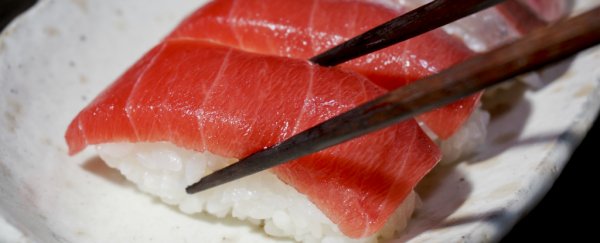Mercury contamination is an issue throughout most of the world's waterways - as a result of mining, many deepwater fish now contain levels that have been associated with health problems and lower IQ in children. But despite the growing contamination issue, we still don't have an efficient way to trap the heavy metal on a large scale.
Australian researchers have now made a material out of industrial waste and discarded orange peel that may be able to do just that. The soft, jelly-like polymer, known as sulphur-limonene polysulfide can suck the mercury right out of water, changing colour as it does so. The best part is that the new material is incredibly cheap, and relies only on products that are already being thrown out daily.
"Mercury contamination plagues many areas of the world, affecting both food and water supplies and creating a serious need for an efficient and cost effective method to trap this mercury," said lead researcher Justin Chalker from Flinders University in South Australia. "Until now, there has been no such method, but the new sulphur-limonene polysulfide addresses this urgent need."
The polymer is made from sulphur - 70 million tonnes of which is produced each year by the petroleum industry - and limonene, an ingredient found mainly in orange peels, of which more than 70 thousand tonnes are produced annually.
When the usually dark red material comes in contact with even small amounts of mercury, the material immediately turns yellow as it begins to soak up the metal, which means it can also work as an environmental sensor. You can see it in action below:
"Not only is this new polymer good for solving the problem of mercury pollution, but it also has the added environmental bonus of putting this waste material to good use while converting them into a form that is much easier to store," said Chalker. "So once the material is 'full it can easily be removed and replaced."
The original aim of Chalker's project actually didn't even involve mercury at all - it was to create a new type of plastic out of recycled industrial waste. They chose sulphur and limonene because of how cheap and readily available the materials were. "There are literally mountains of it lying, unused, around the globe," Chalker said about sulphur.
It wasn't until the team began experimenting with the new substance that they found it just so happened to readily bind to mercury, which means that it literally sucks it out of other substances and chemically stores it.
They've also done toxicity studies to make sure that the new polymer itself isn't toxic to the environment, and the results showed that it would be safe to commercialise and up-scale.
The plan now is to find a way to line industrial water pipes with it, as well as build it into blocks that can act as a 'sponge' in contaminated waterways, or just the ocean in general. They also believe it could be used to help purify soil.
Here it is in a cool little lego-shaped mould that they've made it into… and is it wrong that we kinda want to eat it?

The research has been published in the journal Angewandte Chemie International Edition.
